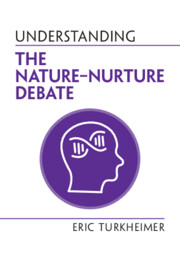Book contents
- Understanding the Nature–Nurture Debate
- Understanding Life
- Understanding the Nature–Nurture Debate
- Copyright page
- Reviews
- Contents
- Foreword
- Preface
- Acknowledgments
- 1 Genesis: Why Do We Care About Nature–Nurture?
- 2 The Worst Legacy of Francis Galton
- 3 Statistical Science and the Invention of Heritability
- 4 Reports of Galton’s Death Are Greatly Exaggerated
- 5 Thesis, Antithesis, Synthesis
- 6 Plomin’s Predictions and the Human Genome Project
- 7 GWAS Unchained, GWAS Unwound
- 8 Intelligence
- 9 IQ, Race, and Genetics
- 10 Nature–Nurture and the Possibility of Human Science
- Summary of Common Misunderstandings
- References and Further Reading
- Figure and Quotation Credits
- Index
1 - Genesis: Why Do We Care About Nature–Nurture?
Published online by Cambridge University Press: 07 November 2024
- Understanding the Nature–Nurture Debate
- Understanding Life
- Understanding the Nature–Nurture Debate
- Copyright page
- Reviews
- Contents
- Foreword
- Preface
- Acknowledgments
- 1 Genesis: Why Do We Care About Nature–Nurture?
- 2 The Worst Legacy of Francis Galton
- 3 Statistical Science and the Invention of Heritability
- 4 Reports of Galton’s Death Are Greatly Exaggerated
- 5 Thesis, Antithesis, Synthesis
- 6 Plomin’s Predictions and the Human Genome Project
- 7 GWAS Unchained, GWAS Unwound
- 8 Intelligence
- 9 IQ, Race, and Genetics
- 10 Nature–Nurture and the Possibility of Human Science
- Summary of Common Misunderstandings
- References and Further Reading
- Figure and Quotation Credits
- Index
Summary
The theory of evolution, as espoused by Charles Darwin in The Origin of Species in 1859, was difficult to accept for religious believers whose assumptions about the world were shattered by it, but Darwin’s The Descent of Man, published 12 years later, posed even greater challenges to people who did accept it, and those challenges continue today. It has often been noted that a disorienting consequence of the Enlightenment was to force people to recognize that humans were not created at the center of the universe in the image of God, but instead on a remote dust-speck of a planet, in the image of mold, rats, dogs, and chimps. For the entirety of recorded history, moral beliefs about humans had been based on the idea that people were in some fundamental sense apart from the rest of nature. Darwin disabused us of that notion once and for all. The scientific and social upheaval that has occurred since Darwin has been an extended process of coming to terms with a unification of humans and the rest of the natural world.
Keywords
- Type
- Chapter
- Information
- Understanding the Nature‒Nurture Debate , pp. 1 - 15Publisher: Cambridge University PressPrint publication year: 2024

